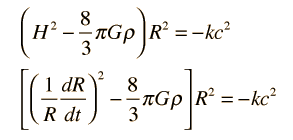Radiation and Matter in the Early Universe
In the early stages of the big bang, most of the energy was in the form of radiation and that radiation was the dominant influence on the expansion of the universe. Later, with cooling from the expansion the roles of mass and radiation changed and the universe entered a mass-dominated era. Recently results suggest that we have already entered an era dominated by "dark energy" , but examination of the roles of mass and radiation are most important for understanding the early universe. Some insight into the expansion can be obtained from a Newtonian expansion model which leads to a simplified version of the Friedman equation.
Using the dimensionless scale factor R to characterized the expansion of the universe, the effective energy densities of radiation and mass scale differently.
 |  |
| Radiation-dominated expansion |
| Mass-dominated expansion |
| Division of energy between photons and massive particles |
References
Carroll & Ostlie
Ch. 29
| HyperPhysics***** Astrophysics | R Nave |
